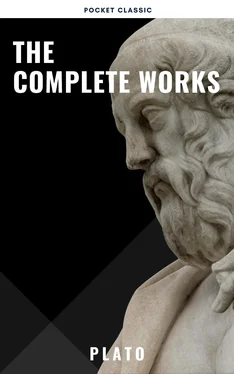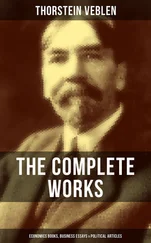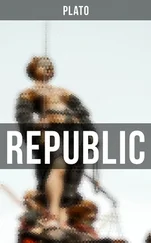BOY: From this.
SOCRATES: That is, from the line which extends from corner to corner of the figure of four feet?
BOY: Yes.
SOCRATES: And that is the line which the learned call the diagonal. And if this is the proper name, then you, Meno’s slave, are prepared to affirm that the double space is the square of the diagonal?
BOY: Certainly, Socrates.
SOCRATES: What do you say of him, Meno? Were not all these answers given out of his own head?
MENO: Yes, they were all his own.
SOCRATES: And yet, as we were just now saying, he did not know?
MENO: True.
SOCRATES: But still he had in him those notions of his—had he not?
MENO: Yes.
SOCRATES: Then he who does not know may still have true notions of that which he does not know?
MENO: He has.
SOCRATES: And at present these notions have just been stirred up in him, as in a dream; but if he were frequently asked the same questions, in different forms, he would know as well as any one at last?
MENO: I dare say.
SOCRATES: Without any one teaching him he will recover his knowledge for himself, if he is only asked questions?
MENO: Yes.
SOCRATES: And this spontaneous recovery of knowledge in him is recollection?
MENO: True.
SOCRATES: And this knowledge which he now has must he not either have acquired or always possessed?
MENO: Yes.
SOCRATES: But if he always possessed this knowledge he would always have known; or if he has acquired the knowledge he could not have acquired it in this life, unless he has been taught geometry; for he may be made to do the same with all geometry and every other branch of knowledge. Now, has any one ever taught him all this? You must know about him, if, as you say, he was born and bred in your house.
MENO: And I am certain that no one ever did teach him.
SOCRATES: And yet he has the knowledge?
MENO: The fact, Socrates, is undeniable.
SOCRATES: But if he did not acquire the knowledge in this life, then he must have had and learned it at some other time?
MENO: Clearly he must.
SOCRATES: Which must have been the time when he was not a man?
MENO: Yes.
SOCRATES: And if there have been always true thoughts in him, both at the time when he was and was not a man, which only need to be awakened into knowledge by putting questions to him, his soul must have always possessed this knowledge, for he always either was or was not a man?
MENO: Obviously.
SOCRATES: And if the truth of all things always existed in the soul, then the soul is immortal. Wherefore be of good cheer, and try to recollect what you do not know, or rather what you do not remember.
MENO: I feel, somehow, that I like what you are saying.
SOCRATES: And I, Meno, like what I am saying. Some things I have said of which I am not altogether confident. But that we shall be better and braver and less helpless if we think that we ought to enquire, than we should have been if we indulged in the idle fancy that there was no knowing and no use in seeking to know what we do not know;—that is a theme upon which I am ready to fight, in word and deed, to the utmost of my power.
MENO: There again, Socrates, your words seem to me excellent.
SOCRATES: Then, as we are agreed that a man should enquire about that which he does not know, shall you and I make an effort to enquire together into the nature of virtue?
MENO: By all means, Socrates. And yet I would much rather return to my original question, Whether in seeking to acquire virtue we should regard it as a thing to be taught, or as a gift of nature, or as coming to men in some other way?
SOCRATES: Had I the command of you as well as of myself, Meno, I would not have enquired whether virtue is given by instruction or not, until we had first ascertained ‘what it is.’ But as you think only of controlling me who am your slave, and never of controlling yourself,—such being your notion of freedom, I must yield to you, for you are irresistible. And therefore I have now to enquire into the qualities of a thing of which I do not as yet know the nature. At any rate, will you condescend a little, and allow the question ‘Whether virtue is given by instruction, or in any other way,’ to be argued upon hypothesis? As the geometrician, when he is asked whether a certain triangle is capable being inscribed in a certain circle (Or, whether a certain area is capable of being inscribed as a triangle in a certain circle.), will reply: ‘I cannot tell you as yet; but I will offer a hypothesis which may assist us in forming a conclusion: If the figure be such that when you have produced a given side of it (Or, when you apply it to the given line, i.e. the diameter of the circle (autou).), the given area of the triangle falls short by an area corresponding to the part produced (Or, similar to the area so applied.), then one consequence follows, and if this is impossible then some other; and therefore I wish to assume a hypothesis before I tell you whether this triangle is capable of being inscribed in the circle’:—that is a geometrical hypothesis. And we too, as we know not the nature and qualities of virtue, must ask, whether virtue is or is not taught, under a hypothesis: as thus, if virtue is of such a class of mental goods, will it be taught or not? Let the first hypothesis be that virtue is or is not knowledge,—in that case will it be taught or not? or, as we were just now saying, ‘remembered’? For there is no use in disputing about the name. But is virtue taught or not? or rather, does not every one see that knowledge alone is taught?
MENO: I agree.
SOCRATES: Then if virtue is knowledge, virtue will be taught?
MENO: Certainly.
SOCRATES: Then now we have made a quick end of this question: if virtue is of such a nature, it will be taught; and if not, not?
MENO: Certainly.
SOCRATES: The next question is, whether virtue is knowledge or of another species?
MENO: Yes, that appears to be the question which comes next in order.
SOCRATES: Do we not say that virtue is a good?—This is a hypothesis which is not set aside.
MENO: Certainly.
SOCRATES: Now, if there be any sort of good which is distinct from knowledge, virtue may be that good; but if knowledge embraces all good, then we shall be right in thinking that virtue is knowledge?
MENO: True.
SOCRATES: And virtue makes us good?
MENO: Yes.
SOCRATES: And if we are good, then we are profitable; for all good things are profitable?
MENO: Yes.
SOCRATES: Then virtue is profitable?
MENO: That is the only inference.
SOCRATES: Then now let us see what are the things which severally profit us. Health and strength, and beauty and wealth—these, and the like of these, we call profitable?
MENO: True.
SOCRATES: And yet these things may also sometimes do us harm: would you not think so?
MENO: Yes.
SOCRATES: And what is the guiding principle which makes them profitable or the reverse? Are they not profitable when they are rightly used, and hurtful when they are not rightly used?
MENO: Certainly.
SOCRATES: Next, let us consider the goods of the soul: they are temperance, justice, courage, quickness of apprehension, memory, magnanimity, and the like?
MENO: Surely.
SOCRATES: And such of these as are not knowledge, but of another sort, are sometimes profitable and sometimes hurtful; as, for example, courage wanting prudence, which is only a sort of confidence? When a man has no sense he is harmed by courage, but when he has sense he is profited?
MENO: True.
SOCRATES: And the same may be said of temperance and quickness of apprehension; whatever things are learned or done with sense are profitable, but when done without sense they are hurtful?
MENO: Very true.
SOCRATES: And in general, all that the soul attempts or endures, when under the guidance of wisdom, ends in happiness; but when she is under the guidance of folly, in the opposite?
Читать дальше












